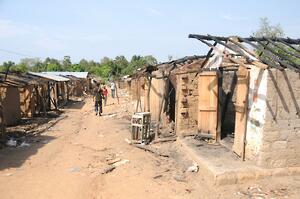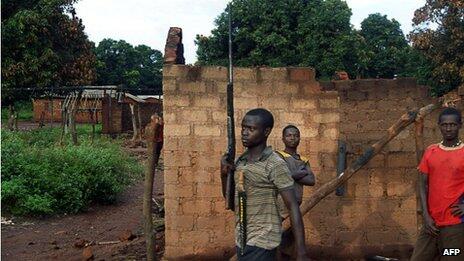The French army deployed 250 troops to the capital of the Central African Republic, the Defence Ministry said on Thursday after clashes broke out between former rebels and militias.
"At this stage 250 French soldiers have been deployed in Bangui to secure and patrol," ministry spokesman Gilles Jarron told a news briefing, adding that the clashes were continuing.
Earlier, a Reuters witness said at least 23 people were killed and 64 others wounded in armed clashes in Bangui.
It was gathered that armed Christian fighters who support the country's exiled president assaulted the capital at dawn on Thursday with rifles and machetes, leaving nearly 100 people dead. Shrouded bodies were lined up in a mosque as dozens of wounded lay on blood-stained hospital floors.
The ambush on Muslim neighborhoods of Bangui came as the United Nations voted to send a contingent of French troops to try to stabilize the country, and French President Francois Hollande announced plans to double the force. The daylong gunbattle touched even the most protected parts of the capital, including the residence of the prime minister, underscoring the volatile mix of arms and ideology facing the arriving French force.
Scores died in Thursday's attack, including 48 people whose bodies were laid out at a mosque in a northern suburb of Bangui. Separately, a Doctors Without Borders spokeswoman, Amelie Ketoff, said another 50 deaths had been confirmed, bringing the toll to 98.
Some died of bullet wounds, others from what appeared to be machete blows using a weapon known in the local language as a "balaka." The Christian militia, whose members are believed to have led the attack Thursday, call themselves the "anti-balaka," reminiscent of the horrific violence once seen in Rwanda.
Rebel leader-turned-president Michel Djotodia appealed for calm, even as his residence was looted and vandalized by the fighters. He announced a dusk-to-dawn curfew in a bid to stem the threat of retaliatory violence against Christians, following the early morning attack on Muslim neighborhoods.
"This morning the enemies of Central African Republic wanted to destabilize the country but they have failed," Djotodia announced in a speech broadcast in the Sango language on state radio.
France already has hundreds of soldiers in Bangui, and an armored personnel carrier and other military vehicles patrolled the streets. The roads were otherwise bare except for the brightly painted pickup trucks driven by the ex-rebels who run the government.
The resolution passed by the U.N. Security Council on Thursday allows France to send hundreds more troops for a temporary period. Speaking from the Elysee Palace in Paris, Hollande said the 600 troops already in the country would be doubled "within a few days, even a few hours" to around 1,200.
The U.N. measure also authorizes the deployment of an African Union-led force to Central African Republic for a year to protect civilians and restore public order. The AU force is replacing a regional peacekeeping mission whose presence has been mainly limited to the capital and a few northern cities.
"It's necessary to intervene very quickly to establish order in this country, in order that humanitarian aid arrives and to avoid an actual civil war based on religion," said France's U.N. ambassador, Gerard Araud, speaking on French RTL radio Thursday.
Central African Republic, a desperately poor country in the heart of Africa where the life expectancy is a mere 48 years, has been roiled by rebellions and coups for decades. The president ousted in March had himself ascended to power by force a decade earlier.
Djotodia, the country's current ruler, who is Muslim, managed to unify several rebel groups in the country's mostly Muslim north, where resentment of the federal government and a sense of disenfranchisement has been rife for years. Once those rebels — known as Seleka, the local word for coalition — were unleashed upon the capital, though, he wielded very little control over the mélange of bush fighters, child soldiers and foreign mercenaries he had recruited along the way.
Before long, human rights groups were documenting cases of Seleka rebels going door to door with machetes, bludgeoning their victims and burning down scores of homes. Supporters of the ousted president began rising up in opposition to the lawless and ruthless rebels, forming self-defense militias. Thursday's attack demonstrates that these fighters are more than vengeance-seeking civilians with artisanal hunting rifles.
"This is not a war between an army and a rebel group. It's really become a conflict between communities where people are being targeted based on their religion," said Peter Bouckaert of Human Rights Watch, who has documented scores of attacks in Central African Republic.
"And it is actually the Muslim community which is the most vulnerable because of the vast abuses committed by the Seleka and the fact that they are a relatively small minority amongst a much larger Christian population who are just furious because of the abuses they have suffered" under the Seleka.
Camal Fodor managed to get his friend to a health clinic by 7 a.m., but seven hours later he still lay listless on a bench.
"The anti-balaka attacked our neighborhood and he was shot in the stomach," Fodor said of his friend, Solomon Haroun, whose blood-soaked T-shirt was dripping blood through the cracks of a wooden bench, where it pooled on the floor below, next to another man awaiting treatment for gunshot wounds.
In another sign of the growing melee, Prime Minister Nicholas Tiangaye confirmed his house had been looted, describing the attackers as a group of Seleka who arrived in three four-wheel-drive pickup trucks.
Speaking in Paris to the Associated Press, Tiangaye said he had been informed that the provisional toll was "more than 100 dead and several hundred wounded."
Babacar Gaye, the U.N. special representative for the Central African Republic, appealed for calm in a joint statement from the U.N., European Union, African Union and France.
In the hills overlooking Bangui, dotted with banana trees, the ex-Seleka fighters spent Thursday afternoon showing off the weapons they'd seized from the enemy earlier in the day. The fighters traded combat boots for flip flops and munched on French baguettes in the shade.
Gen. Bachar Fadoul says the Christian militia may attempt another attack but his troops will be waiting.
"We will hunt them down and chase them from the city," he said.




